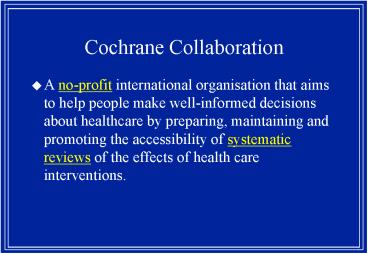Cochrane Collaboration - PowerPoint PPT Presentation
1 / 33
Title:
Cochrane Collaboration
Description:
'It is surely a great criticism of our profession that we have not organised a ... Anaesthesia. Back. Breast cancer. Colorectal cancer. Consumers and communication ... – PowerPoint PPT presentation
Number of Views:54
Avg rating:3.0/5.0
Title: Cochrane Collaboration
1
Cochrane Collaboration
- A no-profit international organisation that aims
to help people make well-informed decisions about
healthcare by preparing, maintaining and
promoting the accessibility of systematic reviews
of the effects of health care interventions.
2
Archie Cochrane
It is surely a great criticism of our
profession that we have not organised a critical
summary, by specialty or subspecialty, adapted
periodically, of all relevant randomised
controlled trials.
3
THE COCHRANE COLLABORATIONlthttp//www.cochrane.or
ggt
4
Principles
- Collaboration
- Building on the enthusiasm of individuals
- Avoiding duplication
- Minimising bias
- Keeping up to date
- Striving for relevance
- Ensuring quality
5
Systematic review
Systematic review
Systematic review
- Structured process involving several steps
- Well formulated question
- Comprehensive data search
- Unbiased selection and abstraction process
- Critical appraisal of data
- Synthesis of data
6
Cochrane Collaboration
Collaborative Review Groups
Centres
Steering Group
Methods Groups
Fields
The Consumer Network
7
Cochrane Collaboration
Collaborative Review Groups
Centres
Steering Group
Methods Groups
Fields
The Consumer Network
8
Cochrane Centres
Canadian
Nordic
San Francisco
German
UK
Dutch
French
Iberoamerican
Italian
San Antonio
Chinese
New England
Brazilian
South African
Australasian
9
Cochrane Centres
- Help organise and register review groups
- Facilitate collaboration among reviewers
- Provide training and consultation
- Establish liaisons
- Promote the Cochrane Collaboration
- Provide unique contribution
10
Cochrane Collaboration
Collaborative Review Groups
Centres
Steering Group
Methods Groups
Fields
The Consumer Network
11
Review Groups 48 registered, 1 possible
- Acute respiratory infections
- Airways
- Anaesthesia
- Back
- Breast cancer
- Colorectal cancer
- Consumers and communication
- Cystic fibrosis and genetic disorders
- Dementia cognitive improvement
- Depression, anxiety neurosis
- Developmental, psychosocial and learning problems
- Drugs and alcohol
- Ear, nose and throat disorders
- Effective practice and organisation of care
- Epilepsy
- Eyes and vision
- Fertility regulation
- Gynaecological cancer
- Heart
- Hepato-biliary
12
Review Groups
- HIV/AIDS
- Hypertension
- Incontinence
- Infectious diseases
- Inflammatory bowel disease
- Injuries
- Lung cancer
- Menstrual disorders and subfertility
- Metabolic and endocrine disorders
- Movement disorders
- Multiple sclerosis
- Muskuloskeletal
- Musculoskeletal injuries
- Neonatal
- Neuromuscular disease
- Oral health
- Pain, palliative and supportive care
- Peripheral vascular diseases
- Pregnancy and childbirth
- Prostatic diseases and urologic cancers
- Renal
- Schizophrenia
13
Review Groups
- Sexually transmitted diseases
- Skin
- Stroke
- Tobacco addiction
- Upper gastrointestinal and pancreatic diseases
- Wounds
- Haematological malignancies (possible)
14
Review Group products
- Reviews
- Specialised register
15
Review Groups
- Reviewers
- International group
- Review relevant trials on specified health care
problems - Long-term commitment
16
Collaborative Review Group process
Systematic Reviewer
Systematic Reviewer
Systematic Reviewer
Editors
Review Group Co-ordinator
Systematic Reviewer
Systematic Reviewer
Cochrane Database of Systematic Reviews
17
Review Manager (RevMan)
- Cochrane Collaboration software for
- Preparing and maintaining protocols and reviews
- Data analysis
- Submitting completed reviews to Cochrane
- database
18
RevMan statistical options
- Peto Method
- Odds Ratio
- Mantel-Haenszel fixed effect and
Dersimonian/Laird random effects - Odds Ratio, Relative Risk, Risk Difference
- Weighted and Standardised Mean Differences
19
The Cochrane Library
- The Cochrane Database of Systematic Reviews
(CDSR) - The Database of Abstracts of Reviews of
Effectiveness (DARE) - The Cochrane Controlled Trials Register (CCTR)
- The Cochrane Methodology Register
20
Cochrane Collaboration
Collaborative Review Groups
Centres
Steering Group
Methods Groups
Fields
The Consumer Network
21
Fields9 registered, 1 possible
- Represent a population, group, or type of care
that overlaps multiple Review Group areas - Examples Primary Health Care, Health Care of
Older Adults, Complementary Medicine, Vaccines,
Rehabilitation and Related Therapies
22
Methods Groups11 registered, 5 possible
- Develop methods and products integral to internal
functioning of the Collaboration - Develop state of the art methods for systematic
reviews - Examples Statistical Methods, Economics, Placebo
Effects, Informatics
23
The Consumer Network
- Provides consumer input
- Helps set priorities
- Helps with dissemination
24
Cochrane Collaboration
Collaborative Review Groups
Centres
Steering Group
Methods Groups
Fields
The Consumer Network
25
Summary of The Cochrane Collaboration
- International collaboration
- Prepares, maintains, and disseminates systematic
reviews - Diverse internal structure (Review Groups,
Centres, Fields, Methods Groups, the Consumer
Network)
26
(No Transcript)
27
Identifying Trials
- Computerised searches CCTR ,MEDLINE, EMBASE
- Hand searches
- Meeting abstracts
- Trial registers
- Pharmaceutical companies
- Word of mouth / Questionnaire
28
- Considerable evidence that positive trials are
more likely to be published than negative
trials - Simple electronic literature search is likely to
result in a sample of trials biased towards the
positive
29
Identification of TrialsMeta-analysis of
neoadjuvant chemotherapy for cervix cancer
30
Publication Status of Eligible
TrialsMeta-analysis of neoadjuvant chemotherapy
for cervix cancer
31
The Use of Individual Patient Data (IPD) in
Systematic Reviews
- Lesley, Stewart1, Mike Clarke2, Jayne Tierney1
- (Cochrane MWG on IPD meta-analyses)
- 1MRC Clinical Trials Unit, Cancer
Division,Cambridge - 2Clinical Trial Service Unit, Oxford
- Statistics in Medicine 1995 14 2057-2079
32
What is an IPD Meta-analysis?
- Involves the central collection, checking and
analysis of updated individual patient data - Include all properly randomised trials, published
and unpublished - Include all patients in an intention-to-treat
analysis
33
THE COCHRANE COLLABORATIONlthttp//www.cochrane.or
ggt































